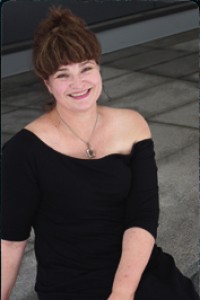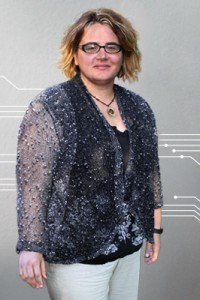Ada Palmer: Beyond the Exponential Age

ADA LOUISE GRACE PALMER was born June 9, 1981 in Washington DC. She grew up in Annapolis MD and went to college two years early, at age 16. She attended Simon’s Rock College of Bard for two years, then transferred to Bryn Mawr College, where she studied Renaissance history. She did her PhD at Harvard, spending time studying in Florence and Rome, partly funded as a Fulbright fellow. She graduated in 2009, and taught at Texas A&M University from 2009-2014 before moving to Chicago to teach at the University of Chicago. She has published many articles on history, and academic books The Recovery of Classical Philosophy in the Renaissance, a Brief Guide (2008, with James Hankins) and Reading Lucretius in the Renaissance (2014). She is also a musician, composer, and singer.
Palmer’s debut novel Too Like the Lightning (2016) won the Compton Crook Award and was a Hugo finalist and a Tiptree honor book. It began the Terra Ignota series, which continues in Seven Surrenders (2017) and The Will to Battle (2017); final volume Perhaps the Stars is forthcoming. Palmer won the John W. Campbell Memorial Award for Best New Writer in 2017.
Excerpts from the interview:
“I grew up reading fantasy and SF. My father had been a fan for many years, so we had a big library of things, and when we went to the public library I gravitated toward books with pictures of dragons on them. He would faithfully check them out and read them to me, even though he already owned different copies of the same book, because you don’t try to explain that to a four-year-old. At one point we were in the public library, and someone had misshelved the giant hardcover edition of The Hobbit that has Smaug on the front in with the Dr. Seuss books. So I picked that up, and I could barely lift it. ‘Read this to me!’ So ever since then I’ve read lots of SF/F, and I wanted to write it since I was small enough that my memories are vague. That just kept up, both reading and writing.
“I did lots of summer writing courses, especially courses in essay writing and prose poetry, which were great. But I really liked history, and enjoyed the meaty question of the history of ideas, how ideas change over the course of human history, what makes a heresy become acceptable, or a commonplace fade away. I was fascinated by that kind of question, which involves a lot of reading and research to investigate. In my view a history degree is just as useful for a writer as a creative writing degree, because it’s about how much writing you’re doing, how much reading you’re doing, how many paragraphs you’re producing. History is a great tool for that, because you spend your time writing and reading. Being a historian is excellent for science fiction, because we have to think about how societies change over long periods of time, and how technologies change society. When I sit down to build a future history, I’m using past history, and as a historian I’m used to thinking about questions such as, ‘What is the origin of the currency that the civilization uses? Where did it come from? Has it changed value over time? If so, how and why? What is the staple crop the civilization farms? How does that affect the density of the dwellings of the rural population? How does that affect how quickly news can spread in a political or military situation?’ Which are not questions that most people are necessarily trained to ask, whether in a science fiction or fantasy world.
“What I look at as a historian often is the different ways people imagine their own pasts. The Italian Renaissance is obsessed with ancient Rome and ancient Greece, and they have a very specific set of ideas, which are not our ideas, nor are they medieval ideas, or 19th century ideas. They had a particular imagined era of Greece and Rome, just as we have our own. All different periods in time have had particular past eras they’ve celebrated, or condemned, or attempted to imitate or characterize in one way or another. I wanted to think about the future in my books in relationship with its past. Which eras of the past are they fascinated by? Which eras are they comparatively silent about? It’s going to be different for different futures. I remember getting a lot of fun comments on the point when we learn this future considers the first World War to have begun in 1914 and ended in 1989, because we relabel and reperiodize. Historians are constantly saying, this era ended here or there. Or whether WWI and WWII are two wars or one. Something like the Thirty Years’ War, are they independent wars that have been relabeled and renamed at different points?
“I started worldbuilding Terra Ignota in the latter parts of undergrad, and was continuing to build it through the initial stages of grad school, and then writing the books in the later stages. I do tons of worldbuilding – usually years until I feel I know the world really well. I was worldbuilding the world of Terra Ignota for five years. Then I sit down to outline the series. It took me six months to outline all four books, beginning to end. I don’t feel like I know a world thoroughly until I know about ten times as much information as will actually come up in the book. That way, as I’m writing, if I find myself gravitating towards something unexpected, I know it. I don’t have to dodge around it. I don’t have to think, ‘What cuisine is there going to be in that place?’ I don’t have to reach for stew because stew is the obvious choice. I know that everything won’t be in the books, so as a result, I relax and fit in whatever fits in. There are always a few things I’m determined to put in, because they are important issues I want to explore in the book.
“I try to talk about things that are happening in the world today, but also things that are recurrent in lots of eras. Since certainly the 18th century if not before, we, as a civilization, at least starting in the Western tradition, have been heavily rethinking gender and what gender means. That is absolutely a hot issue right now, and for a lot of people, it feels like a very recent hot issue, because a new iteration of that conversation has come up in newly politicized ways. But it’s been a hot and politicized issue in different ways for 300 years, and it’s plausible it will be a politicized issue again for another several centuries. There are a lot of things my series looks at: the relationship between people and the government, questions about how much self-determination people have in their political world, questions about globalization vs. group identity that are absolutely hot issues right now, but have been hot issues for a long time, and will be hot issues going forward. I always find it very interesting, because people say, ‘These books feel so current,’ and when the books comment on late-stage America in political crisis, people think I’m addressing issues raised in 2016…. but I finished writing book two in 2008. Those issues were hot issues then, and they will be again.
“I don’t see cycles in history so much as I see the same thing becoming useful for a new purpose. Or the same set of questions raised in a new context, for new reasons, and asked in new ways. When you see a historical revival, it’s often because there’s a contemporary crisis of that moment, and a historical revival feels like a way to solve and address and respond to that crisis. It’s not actually as if the Italian Renaissance genuinely reconstructed ancient Rome. They redeployed ancient Rome, and turned ancient Rome into a powerful tool, which could achieve a bunch of social and political things. It can feel cyclical, but in no way is it cyclical – it’s much more that it’s cumulative.
Interview design by Stephen H. Segal. Photo by Liza Groen Trombi.
Read the complete interview in the May 2018 issue of Locus.
 While you are here, please take a moment to support Locus with a one-time or recurring donation. We rely on reader donations to keep the magazine and site going, and would like to keep the site paywall free, but WE NEED YOUR FINANCIAL SUPPORT to continue quality coverage of the science fiction and fantasy field.
While you are here, please take a moment to support Locus with a one-time or recurring donation. We rely on reader donations to keep the magazine and site going, and would like to keep the site paywall free, but WE NEED YOUR FINANCIAL SUPPORT to continue quality coverage of the science fiction and fantasy field.








